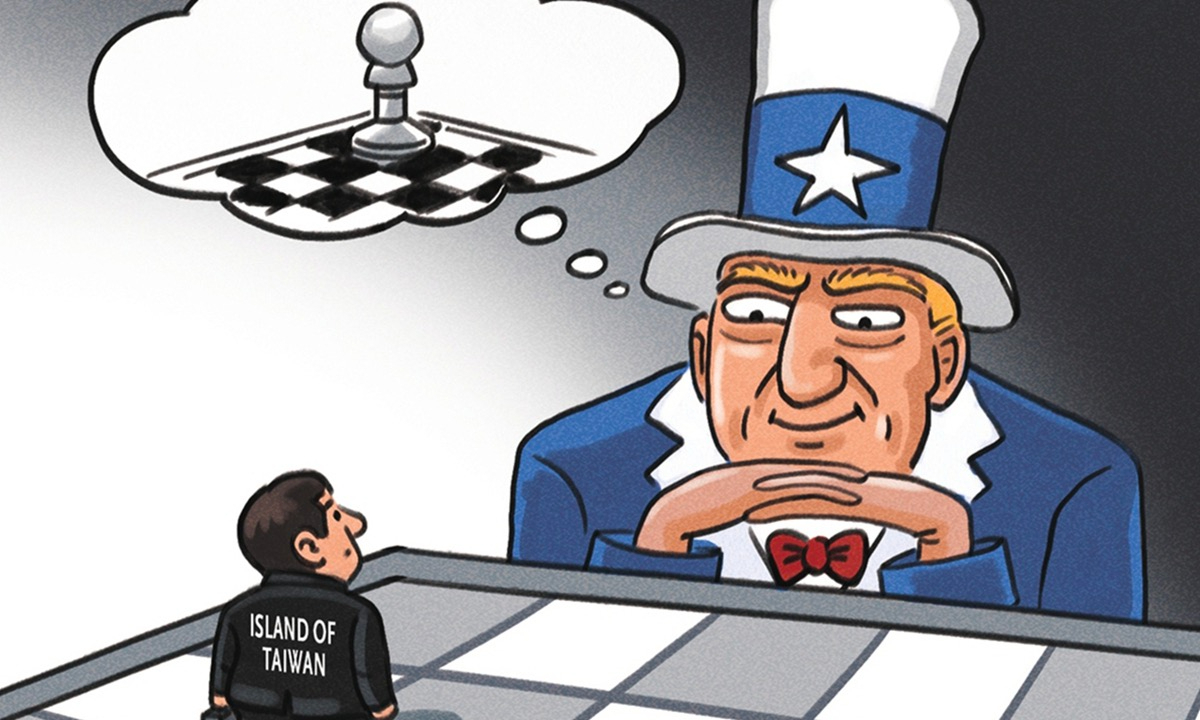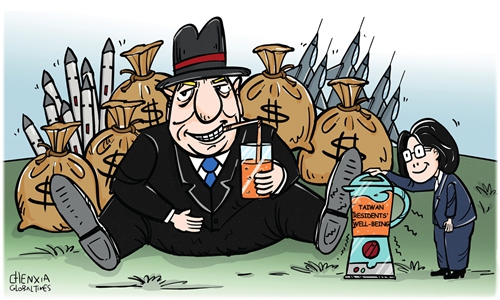As US collateral damage, Taiwan residents should adopt peaceful reunification while there is time

Illustration: Liu Rui/GT
The US has long been trying to convince the residents of Taiwan island that America cares first and foremost for the safety and welfare of the islanders, and that if they choose independence over reunification in one China, the US will always stand ready to share their sacrifices. So, it may come as a shock when the islanders realize that America's only interest in the island since 1949 has been the terrain which they occupy, not its people.
From the pause in the Chinese civil war the US knew that Chiang Kai-shek's dream of retaking the mainland in the near term was unrealistic. General Douglas MacArthur implied as much when he described the island territory as an "unsinkable [US] aircraft carrier" in any war with China, rather than an exiled and allied society worth defending.
President Harry Truman followed suit when he declared that Taiwan (formerly known as. Formosa) was vital to the national security of the US and the free world. By 1958 president Dwight Eisenhower had deployed significant military forces on and around Formosa under a 1954 mutual defense treaty. US weapons included nuclear-armed Matador Missiles, and nuclear weapons were staged on the island under US command and control.
In the 1970s US' plans for Taiwan threatened to unravel. In 1971 the United Nations (UN) ejected the ROC and seated the PRC. President Richard Nixon then announced his intention to visit the PRC, and in 1972 ordered the removal of all nuclear weapons. Then in 1979 president Jimmy Carter established diplomatic relations with PRC and abrogated the mutual defense treaty.
The presidential decisions enraged China-averse members of the US Congress. As a rebuke, in 1979 Congress passed the Taiwan Relations Act (TRA) to poison peaceful mainland-Taiwan unification efforts by implying US military intervention in China's internal civil war affair.
The TRA caused concern for both the Chinese mainland and the US' purported ally, Taiwan. To assuage Taiwan's anxiety President Ronald Reagan provided Six Assurances to Taiwan implying that US military intervention could always be counted on.
The TRA and Six Assurances constitute the actual US policy today. They also fuel secessionist ambitions, undermining peaceful reunification. For the US the island remains key military terrain in a coming war with the Chinese mainland, and the horrific civilian toll will be acceptable collateral damage.
The mainland always suspected the US commitment to the three Joint Communiqués was disingenuous. Precedent shows the US prefers to fight wars on proxy battlefields. Human carnage caused by US weapons on foreign soil is deemed irrelevant, so long as vital foreign policy objectives are achieved and the US homeland remains untouched. Champions of independence in the US will deny any such accusations. In addition to the priceless value of each island citizen's life, the US must protect all aspects of Taiwan's exemplary capitalist utopia. But the US military build-up and regional introduction of nuclear-capable Tomahawk cruise missiles exposes their denials as obfuscation.
Insistent US deniers will also point to the island's allegedly irreplaceable semiconductor industry as a treasure the civilized world must preserve. However, those talking points omit critical facts.
In anticipation of war, the island's chip producers are out-sourcing to new overseas facilities. Concurrently, the US and European Union are robustly subsidizing their respective chip development and production sectors. Taiwan's intellectual talent is simultaneously emigrating, many enticed with US-Taiwan dual citizenship and offers from well-heeled foreign competitors.
Finally, it is reported the US intends to sabotage the island's chip manufacturing equipment to prevent PRC use. Protecting Taiwan's chip industry is no longer a credible justification for US military intervention. The island's sole value is its coveted function as key military terrain for the US, as it was in 1949.
Ukraine shows that the barbaric nature of war has not changed, and that territory reduced to death and ruins retains its military value.
Residents of Taiwan island must recognize that the island's secession and independence will not be permitted by the mainland, and are not negotiable. Also, the mainland values every island resident as extended Han family, while the US sees them as expendable impediments.
Before the Taiwanese citizenry is decimated in the coming high intensity conflict, they should soberly consider peaceful reunification as one China, a development that will preserve the island's 24 million residents and prevent a global catastrophe.
The author is a retired Marine Corps infantry officer and a former Pentagon employee. Opinions are of the author and do not represent the US government. opinion@globaltimes.com.cn

